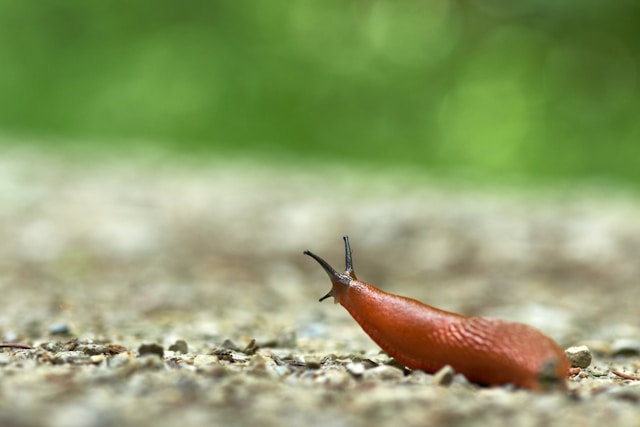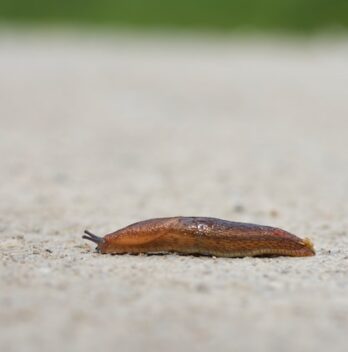Slugs can be a nightmare for gardeners. These slimy pests can quickly devour your plants, flowers, and vegetables, leaving behind damage and frustration. However, many gardeners hesitate to use chemical pesticides to deal with slugs, as these can harm beneficial insects and the environment. So how to get rid of garden slugs naturally?
The good news is that several natural methods exist for getting rid of garden slugs naturally and keeping your garden thriving without harmful chemicals. We’ll cover everything you need to know about identifying slug infestations, understanding their behavior, and, most importantly, eliminating them using natural techniques.
Why Are Slugs a Problem in the Garden?
Slugs feed primarily at night, attacking tender plant leaves, seedlings, and fruits. They can cause significant damage if left unchecked, particularly in vegetable gardens. Here’s why slugs are a common garden problem:
- Moist environments: Slugs thrive in damp, shady areas, which is common in many gardens.
- Preference for young plants: They tend to go after young, tender plants, making seedlings especially vulnerable.
- Rapid reproduction: Slugs can reproduce quickly, leading to an infestation that’s hard to control without intervention.
1. Identify the Presence of Slugs in Your Garden
Before you begin slug control, it’s important to confirm that slugs are the culprit behind the damage in your garden. Look for the following signs:
- Slimy trails: Slugs leave behind shiny, slimy trails as they move, which are easy to spot on leaves and the
soil . - Ragged holes: Slugs typically create irregular holes in leaves, especially on low-growing plants and seedlings.
- Nighttime activity: Since slugs are nocturnal, inspect your garden at night with a flashlight to catch them in action.
You can implement natural control methods once you’ve identified that slugs are present.

2. Handpicking: Simple but Effective
Although it might seem unappealing, handpicking is one of the most effective and immediate ways to reduce slug numbers.
- Best time to pick: Go out after dusk or early morning when slugs are most active. Wear gloves and carry a bucket of soapy water to drop the slugs into—this will kill them quickly.
- Consistent effort: Handpicking should be done regularly, especially after rain or watering when slugs are more likely to be out.
Pro Tip: During the day, you can place boards or overturned pots in your garden, which slugs will hide under. Check under these traps in the evening and remove the slugs you find.
3. Barriers and Traps: Natural Slug Deterrents
Creating barriers and traps can effectively prevent slugs from reaching your plants. Here are a few natural methods to try:
Copper Tape and Barriers
Copper is a natural slug repellent because slugs experience an unpleasant reaction when they come into contact with it.
- How to use copper: Place copper tape around the rims of pots, raised beds, or other garden structures. Slugs will avoid crossing it.
- Copper strips in the
soil : You can also embed copper strips into thesoil around plants you want to protect.
TAPE FOR PLANTS – You can wrap copper tape around the base of small plants and seedlings to protect plants.
Eggshells and Coffee Grounds
Both eggshells and coffee grounds create rough surfaces that slugs dislike.
- Eggshells: Crush eggshells and sprinkle them around the base of your plants. The sharp edges are uncomfortable for slugs to crawl over.
- Coffee grounds: Used coffee grounds are another natural barrier. Coffee has also been shown to act as a mild slug repellent.
Beer Traps
Beer is a well-known slug attractant, and beer traps can effectively reduce their numbers.
- How to make a beer trap: Bury a shallow container, such as a plastic cup or saucer, into the ground so the rim is level with the
soil . Fill it with beer, which will attract slugs. Once they enter the trap, they will drown. - Replace frequently: Check and replace the beer every few days to keep the trap effective.
Pro Tip: Position beer traps away from the plants you’re protecting. This will lure slugs away from your plants, not toward them.
4. Encourage Natural Predators
One of the best natural ways to control slugs is to introduce or encourage their natural predators into your garden.
- Attract birds: Birds such as thrushes, blackbirds, and robins are natural slug predators. To attract birds to your garden, install bird feeders, baths, and nesting boxes.
- Introduce frogs and toads: Frogs and toads are excellent slug hunters. You can encourage them to stay in your garden by creating damp, shady areas with shallow ponds or water features.
- Ground beetles and hedgehogs: These animals also feast on slugs. Consider leaving parts of your garden a bit wild to create habitats for these helpful predators.
Pro Tip: Avoid using chemical pesticides that could harm these beneficial animals.
5. Use Natural Repellents and Mulches
Several natural substances can repel slugs or make it more difficult for them to navigate your garden. These mulches and repellents are safe for plants and animals.
Diatomaceous Earth (DE)
Diatomaceous earth is a fine powder made from fossilized algae. It is safe for humans and pets but lethal to slugs.
- How it works: When slugs crawl over diatomaceous earth, it damages their soft bodies, causing them to dehydrate and die.
- Application: Sprinkle a thin layer of DE around the base of plants, especially after watering or rain.
- Effective
- Natural pest control
- Safe for Children & Pets
- Messy
Wood Ash
Wood ash from a wood stove or fire pit is another effective slug deterrent.
- How to use: Spread wood ash around the perimeter of your garden beds or plants. The ash creates an uncomfortable surface for slugs, and it also adds potassium to your
soil .
All Natural Ashes from Organically Grown Hardwood Timber (2 Pounds)
Garlic Spray
Garlic has natural insect-repelling properties and can be used to ward off slugs.
- Make your own garlic spray: Crush several garlic cloves and steep them in hot water for 24 hours. Strain the mixture and spray it on the
soil and plants in your garden.
6. Watering Strategies: Keep Your Garden Dry
Slugs thrive in moist environments, so adjusting your watering habits can help control their population.
- Water in the morning: Water your garden early in the day, so the
soil dries out by evening when slugs are most active. Avoid watering late in the day, as this creates damp conditions that slugs love. - Use drip irrigation: Consider using drip irrigation systems that deliver water directly to plant roots, keeping the surface
soil drier and less inviting for slugs.
Pro Tip: Remove mulch from the base of vulnerable plants during slug season, as mulch can retain moisture and provide hiding spots for slugs.
7. Plant Slug-Resistant Plants
Another way to deter slugs naturally is by planting species they tend to avoid. By incorporating these plants into your garden, you can reduce slug infestations naturally.
- Slug-resistant plants: Consider growing plants such as lavender, rosemary, ferns, and certain types of grasses, which slugs are less likely to feast on.
- Use as companion plants: Plant slug-resistant varieties near more vulnerable plants to create a natural barrier.
Conclusion: Slug Control Without Chemicals
To get rid of garden slugs doesn’t have to involve harmful chemicals. By using natural methods like handpicking, creating barriers, attracting predators, and adjusting watering habits, you can significantly reduce the slug population and protect your plants.
With these tips, you’ll not only keep your garden safe from slugs but also contribute to a healthier, more sustainable environment. So, gear up and start implementing these natural solutions to keep your garden slug-free!
🐌 Recommended Slug Control Products
- Effective
- Natural pest control
- Safe for Children & Pets
- Messy









